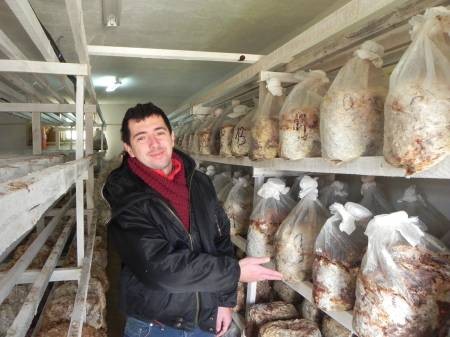
Shiitake mushrooms have been used in herbal remedies by the Chinese for many centuries. The East Asian fungus has been used to treat anything from poor circulation and respiratory problems to premature aging. Its health-promoting properties and rich flavor make this delicacy the second most commonly cultivated edible mushroom in the world.
Miloš Grujić, a civil engineering student from Kosovo's Zupče/Zupçë village in the town of Zubin Potok, first discovered the shiitake mushroom while surfing the Internet in search of a viable business idea. An entrepreneurial young man in a country with high unemployment, Grujić did not want to wait for a job to find him. After researching what it would take to cultivate the mushrooms, he developed a business plan and approached USAID’s Community Action Initiative Program for help to purchase his startup materials.
USAID provided Grujić with a $9,000 grant in March 2013, which he added to his own $1,750 investment to purchase substrates—a surface on which the mushrooms grow—shiitake seeds, and the equipment needed to launch his business.
“It is very difficult for young people to find a job today, which is why this grant means a lot to me,” Grujić explains. “It is not easy to study, attend the classes, and build my shiitake business, but I am trying very hard and I want to succeed.”
As the mushrooms require constant attention, Grujić used part of his startup funds to hire an employee to care for the delicate product while he is in class. Currently, he has one inoculation room where the mushrooms are cultivated, with around 500 substrates, earning him $6 to $9 per substrate.
“I’ve had such great success in selling my shiitake to local supermarkets, that I will soon expand my business to cultivate around 1,500 substrates,” explains Grujić, who already has plans to add a second inoculation room once he fills the first.
Grujić does not have to look far for motivation. “The shiitake business enables me to earn around $750 per month, which is enough to support my family,” he says.
USAID's Community Action Initiative Program runs from July 2010 to July 2014. It supports community development and infrastructure rehabilitation in 40 Kosovo communities, builds strong civil society organizations, and improves economic and employment opportunities.







Comment
Make a general inquiry or suggest an improvement.